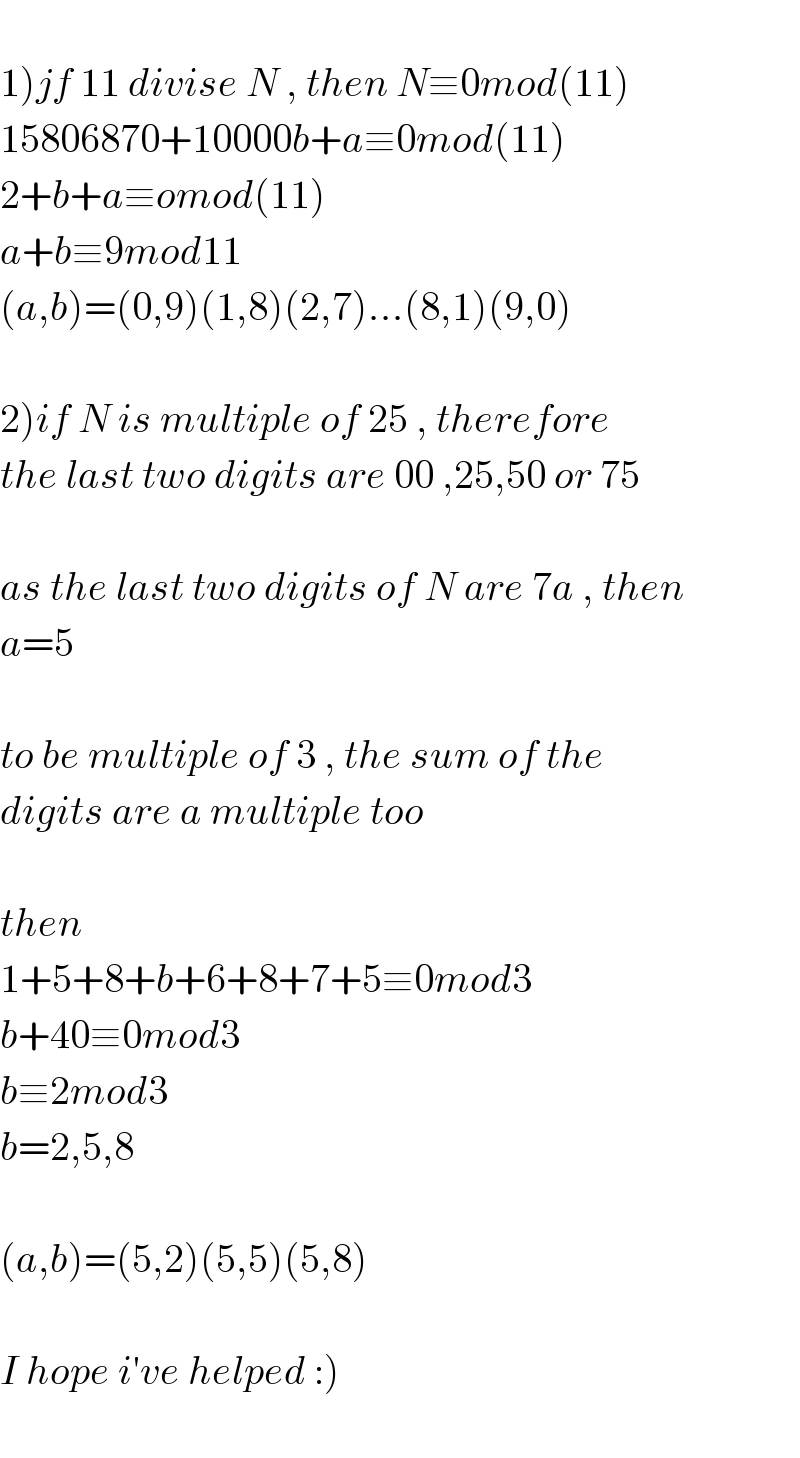
Question Number 121568 by mathocean1 last updated on 09/Nov/20
![Given: N in base 10 is 158b687a where b and a are digits (a<b). Given: N≡2+a[4]. 1) Determinate couples (a;b) such that 11 divise N. 2) Determinate couples (a;b) such that 3 and 25 divise N. thanks.](Q121568.png)
$$\mathrm{Given}:\:\mathrm{N}\:\mathrm{in}\:\mathrm{base}\:\mathrm{10}\:\mathrm{is} \\ $$ $$\mathrm{158b687a}\:\mathrm{where}\:\mathrm{b}\:\mathrm{and}\:\mathrm{a}\:\mathrm{are} \\ $$ $$\mathrm{digits}\:\left(\mathrm{a}<\mathrm{b}\right).\:\mathrm{Given}: \\ $$ $$\mathrm{N}\equiv\mathrm{2}+\mathrm{a}\left[\mathrm{4}\right]. \\ $$ $$\left.\mathrm{1}\right)\:\mathrm{Determinate}\:\mathrm{couples} \\ $$ $$\left(\mathrm{a};\mathrm{b}\right)\:\mathrm{such}\:\mathrm{that}\:\mathrm{11}\:\mathrm{divise}\:\mathrm{N}. \\ $$ $$\left.\mathrm{2}\right)\:\mathrm{Determinate}\:\mathrm{couples}\:\left(\mathrm{a};\mathrm{b}\right) \\ $$ $$\mathrm{such}\:\mathrm{that}\:\mathrm{3}\:\mathrm{and}\:\mathrm{25}\:\mathrm{divise}\:\mathrm{N}. \\ $$ $$\mathrm{thanks}. \\ $$
Answered by kolos last updated on 17/Nov/20

$$ \\ $$ $$\left.\mathrm{1}\right){jf}\:\mathrm{11}\:{divise}\:{N}\:,\:{then}\:{N}\equiv\mathrm{0}{mod}\left(\mathrm{11}\right) \\ $$ $$\mathrm{15806870}+\mathrm{10000}{b}+{a}\equiv\mathrm{0}{mod}\left(\mathrm{11}\right) \\ $$ $$\mathrm{2}+{b}+{a}\equiv{omod}\left(\mathrm{11}\right) \\ $$ $${a}+{b}\equiv\mathrm{9}{mod}\mathrm{11} \\ $$ $$\left({a},{b}\right)=\left(\mathrm{0},\mathrm{9}\right)\left(\mathrm{1},\mathrm{8}\right)\left(\mathrm{2},\mathrm{7}\right)...\left(\mathrm{8},\mathrm{1}\right)\left(\mathrm{9},\mathrm{0}\right) \\ $$ $$ \\ $$ $$\left.\mathrm{2}\right){if}\:{N}\:{is}\:{multiple}\:{of}\:\mathrm{25}\:,\:{therefore} \\ $$ $${the}\:{last}\:{two}\:{digits}\:{are}\:\mathrm{00}\:,\mathrm{25},\mathrm{50}\:{or}\:\mathrm{75} \\ $$ $$ \\ $$ $${as}\:{the}\:{last}\:{two}\:{digits}\:{of}\:{N}\:{are}\:\mathrm{7}{a}\:,\:{then} \\ $$ $${a}=\mathrm{5} \\ $$ $$ \\ $$ $${to}\:{be}\:{multiple}\:{of}\:\mathrm{3}\:,\:{the}\:{sum}\:{of}\:{the} \\ $$ $${digits}\:{are}\:{a}\:{multiple}\:{too} \\ $$ $$ \\ $$ $${then} \\ $$ $$\mathrm{1}+\mathrm{5}+\mathrm{8}+{b}+\mathrm{6}+\mathrm{8}+\mathrm{7}+\mathrm{5}\equiv\mathrm{0}{mod}\mathrm{3} \\ $$ $${b}+\mathrm{40}\equiv\mathrm{0}{mod}\mathrm{3} \\ $$ $${b}\equiv\mathrm{2}{mod}\mathrm{3} \\ $$ $${b}=\mathrm{2},\mathrm{5},\mathrm{8} \\ $$ $$ \\ $$ $$\left({a},{b}\right)=\left(\mathrm{5},\mathrm{2}\right)\left(\mathrm{5},\mathrm{5}\right)\left(\mathrm{5},\mathrm{8}\right) \\ $$ $$ \\ $$ $$\left.{I}\:{hope}\:{i}'{ve}\:{helped}\::\right) \\ $$ $$ \\ $$
Commented bymathocean1 last updated on 19/Nov/20

$${thank}\:{you}\:{very}\:{much}\:{sir}! \\ $$
